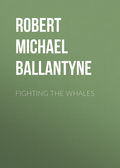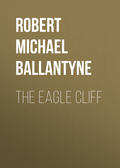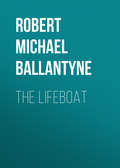
Robert Michael Ballantyne
The Life of a Ship
“Take in all sail!” roared the captain. The men rushed to obey, and Davy was so well accustomed to the work that he too climbed to his usual place on the main topsail yard and began to haul in the sail. He could barely see the man next to him, and it was with difficulty he kept his hold of the yard, while the ship tossed and plunged in the waves. When nearly all sail was taken in the ship went easier, and the men assembled on the deck to await further orders. The gale increased, and suddenly the small bit of the fore-topsail that was hoisted burst into shreds with a clap like thunder, and carried away the fore-topmast with all its yards and rigging, part of the bowsprit, and the top of the mainmast. “Clear away the wreck!” shouted the captain. Some of the men ran for axes, and began to cut the ropes that fastened the broken masts to the ship, for there was a danger of the ship striking against them and knocking a hole in her side while she plunged. Still the gale increased, and the mizzen topmast went overboard. The “mizzen” is the mast nearest to the stern. It is the smallest of the three. The lightning now began to flash, and the thunder to roar, while the crew of the Fair Nancy stood on her deck clinging to the bulwarks, lest they should be washed overboard! Little Davy looked at the man next him, and saw that it was Ben Block. “Oh, Ben!” said he, “what an awful night it is! Do you think we shall be lost?”
Ben shook his head. “I don’t know, lad; but the Lord can save us, if it be His will. Pray to Him, boy.”
“My poor mother!” murmured Davy, as the tears rose to his eyes, while he prayed to God in his heart that he might be spared to see her again. At that moment there came a wave so big and black that Davy thought the sea was going to turn upside down. It came on like a great dark mountain, high above the ship. “Hold on for your lives!” cried some of the men, as the wave fell with a fearful crash and turned the ship over on her side—or on her “beam-ends,” as sailors call it. They were in awful danger now, as the sea began to pour down into the cabins, and the masts and sails being in the water the ship could not “right,” or become straight again. “Cut away the masts!” roared the captain. The deck was now standing up like a wall, so that the men could not walk on it, but they managed with great difficulty to reach the mizzenmast, which a few strokes of the axe sent overboard. Still the ship lay on her beam-ends. “Cut away the mainmast!” cried the captain. The order was obeyed, and with a loud report, like a cannon shot, it went overboard too. Immediately after the fall of the mainmast there came another wave, from which they never expected to rise again. It dashed down on the stern and drove in the cabin windows; but the worst of it was, that it swept away all the boats belonging to the ship. They had been securely fastened to the deck; but this wave carried them all away, so that now, if the ship sank, their only chance of escape was gone. The same wave snapped the foremast across near the deck. This was fortunate, because it enabled the ship to “right” herself, and once more the men were able to stand on the deck. The storm continued to rage still, however, and some of the men were sent to work the pumps, for there was a great deal of water in the ship now; so much, indeed, that she could hardly float. Another party were ordered to fit up a small mast, which they tied to the stump of the foremast. This new one was called a “jury-mast;” and as they could not sail without a mast of some kind or other, they were very glad when they saw it up and a sail hoisted on it. During the night, however, another heavy wave broke this mast away also; so they were again left to toss like a log on the stormy waters.
All this time the men were working hard at the pumps, but, although they worked for many hours without stopping, the water continued to increase in the hold, and they saw that the ship had sprung “a leak;” that is to say, some of the planks had started, or the seams had opened, and the water was pouring into it so fast that it was evident she would soon sink. This was very awful indeed. Some of the men began to cry to God for mercy, others tore their hair and ran about like madmen, while some sat down and silently prepared to die!
The morning light came at last. But what a sad sight it rose upon. The once noble ship now lay a wreck upon the water, with the masts and sails gone and her shattered hull ready to sink. The captain, who seemed to have lost all hope when the jury-mast broke, was standing on the poop, looking anxiously round the horizon in hopes of seeing a sail—but in vain. Davy stood beside him, and looking up in his face, said, “Please, sir, could we not make a raft?”
“Right, boy, right,” replied the captain; “you’re the best ‘man’ amongst us. We’re no better than girls to be giving way to despair in this way. Hallo! lads, rouse up there; get all the spare yards and spars you can, and make a raft. Look sharp now!”
The captain said this in such a quick, commanding tone that all the sailors jumped to obey him, and in five minutes they were busily at work on the raft. First, they collected all the broken yards and bits of masts that were still floating alongside, dragging by the ropes that fastened them to the sides of the ship. These they arranged side by side, and tied them firmly together with ropes. Then they collected all the spare timbers that were in the ship, and putting these above the others, fastened them with ropes too. After that they tore off some of the planks from the decks and bulwarks, with which they made a kind of floor to the raft. All this, although it takes a short time to tell, took a long, long time to do; for it was hard work moving such heavy timbers, and the poor men were very tired, having been up in the storm all night. Besides this, although the wind had ceased, the waves were still high and would not let them work quietly. However, they finished it at last, and after it was done, they put a number of barrels of biscuit and some casks of water and wine on board. Then they put a few blankets and a compass—that useful little machine that points always to the north, and shows the sailor which way to go, so that he sails in the dark night as surely as in the broad day.







